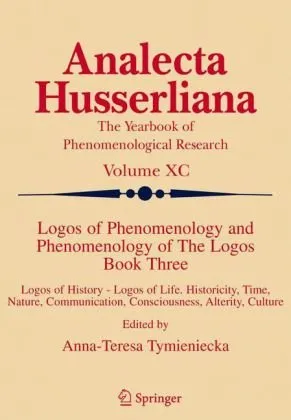Logos of Phenomenology and Phenomenology of The Logos, Book 3: Logos of History - Logos of Life Historicity, Time, Nature, Communication, Consciousness, Alterity, Culture
4.5
Reviews from our users

You Can Ask your questions from this book's AI after Login
Each download or ask from book AI costs 2 points. To earn more free points, please visit the Points Guide Page and complete some valuable actions.Introduction to "Logos of Phenomenology and Phenomenology of The Logos, Book 3"
"Logos of Phenomenology and Phenomenology of The Logos, Book 3: Logos of History - Logos of Life Historicity, Time, Nature, Communication, Consciousness, Alterity, Culture" is a seminal exploration into the dynamic intersections between the historical, cultural, and philosophical foundations of human existence. Edited by Anna-Teresa Tymieniecka, this volume represents an essential cornerstone in the vast framework of phenomenological inquiry. By focusing on the intricate relationship between the Logos of History and the Logos of Life, the book provides profound philosophical insights into the temporal, natural, and social dimensions of human life. In doing so, it bridges the gap between abstract existential questions and the concrete lived experiences of humanity.
This work is part of a larger series that delves into phenomenology's critical role in understanding the Logos—a fundamental principle that binds the multiplicity of existence across time and space. Distinctly structured to address complex themes of historicity, nature, communication, consciousness, alterity, and culture, Book 3 is a vital resource for scholars, philosophers, and anyone interested in the phenomenological tradition. Each chapter serves as both an invitation and a challenge to engage deeply with the issues that define the human condition within historical and cultural contexts.
Detailed Summary of the Book
The third installment in the "Logos of Phenomenology and Phenomenology of The Logos" series provides a refined discourse into how phenomenology addresses the entangled nature of human existence. The book's principal focus revolves around the idea of "Logos of History" and how it intertwines with the "Logos of Life." This intersection is expounded through themes of historicity—our embeddedness in historical processes—and life's dynamic manifestations in time, nature, communication, consciousness, alterity, and culture.
The volume addresses questions fundamental to philosophical anthropology: How can historical contexts shape our understanding of existence? What role does nature play in our lived experiences? How do communicative acts and cultural expressions bridge the gap between subjectivity and otherness? Through essays contributed by leading phenomenologists, the text weaves together these questions to build a holistic framework that reflects the complex structures of human life.
The chapters elucidate how phenomenology remains a critical methodological tool for addressing both the universal and singular aspects of human existence. From examining temporal consciousness to unpacking cultural alterity, the book offers a spectrum of perspectives that enrich our understanding of ourselves as historical beings situated within a web of social and natural relations.
Key Takeaways
- Phenomenology provides a nuanced lens to examine the relationship between historical processes and subjective lived experiences.
- The Logos of Life encapsulates the dynamic interplay between nature, history, and culture in shaping human existence.
- Alterity, or "otherness," plays a significant role in developing self-awareness and understanding in intersubjective relationships.
- Human life is deeply enmeshed in the temporal continuum, where past influences, present conditions, and future aspirations interlock.
- Communication serves as a bridge for shared meaning-making, enabling a deeper connection between individuals and communities.
Famous Quotes from the Book
"The being of life manifests itself not in isolation, but within the interconnected weave of historical, cultural, and natural dimensions."
"To understand existence is to perceive the eternal interplay of time and meaning, past and present, self and other."
Why This Book Matters
"Logos of Phenomenology and Phenomenology of The Logos, Book 3" stands out as a landmark contribution to the study of phenomenology and its relevance to contemporary thought. In an era marked by shifting cultural paradigms, this work reminds readers of the enduring significance of historical and philosophical reflection. It reaffirms the relevance of phenomenology in addressing today's challenges, from understanding identity and otherness to grappling with notions of temporality and cultural heritage.
Moreover, the book breaks new ground by emphasizing the intricate alignment of philosophy with lived experience. It offers readers not only a theoretical understanding of phenomenology but also practical avenues for applying its insights to daily life. By engaging with the text, readers are inspired to see their own lives as part of an unfolding historical and cultural narrative, interconnected with the broader tapestry of humanity.
Free Direct Download
You Can Download this book after Login
Accessing books through legal platforms and public libraries not only supports the rights of authors and publishers but also contributes to the sustainability of reading culture. Before downloading, please take a moment to consider these options.
Find this book on other platforms:
WorldCat helps you find books in libraries worldwide.
See ratings, reviews, and discussions on Goodreads.
Find and buy rare or used books on AbeBooks.
1202
بازدید4.5
امتیاز50
نظر98%
رضایتReviews:
4.5
Based on 0 users review
"کیفیت چاپ عالی بود، خیلی راضیام"


